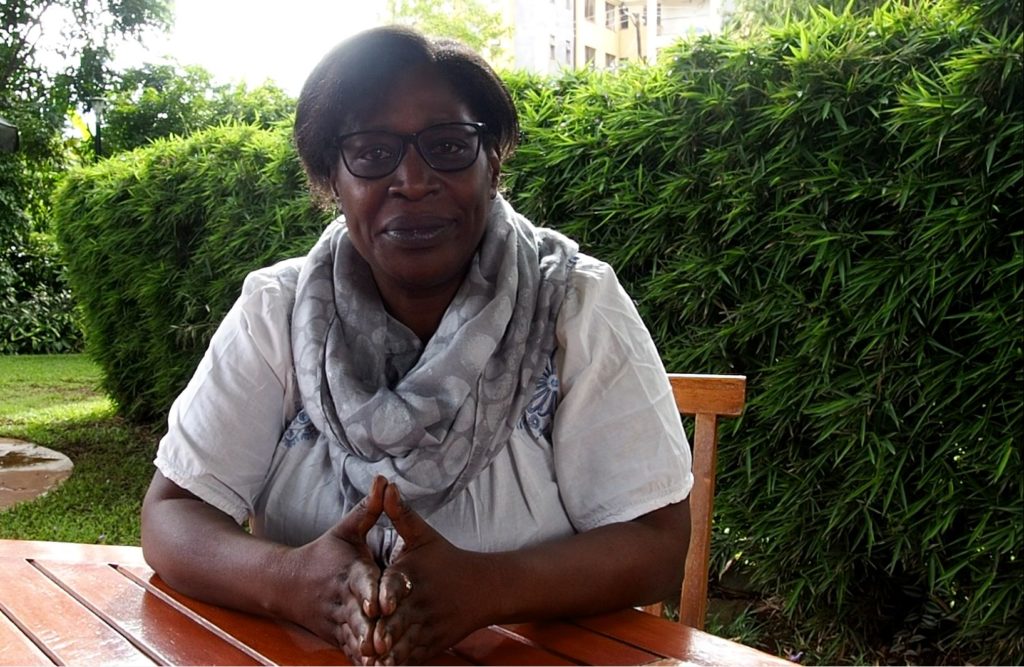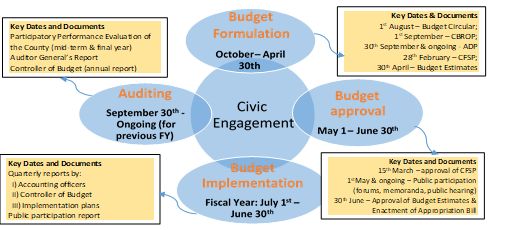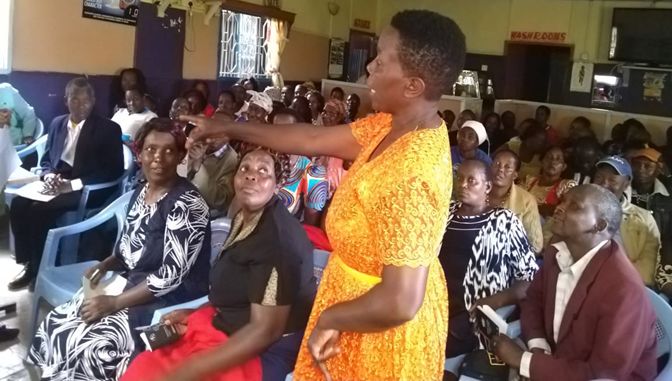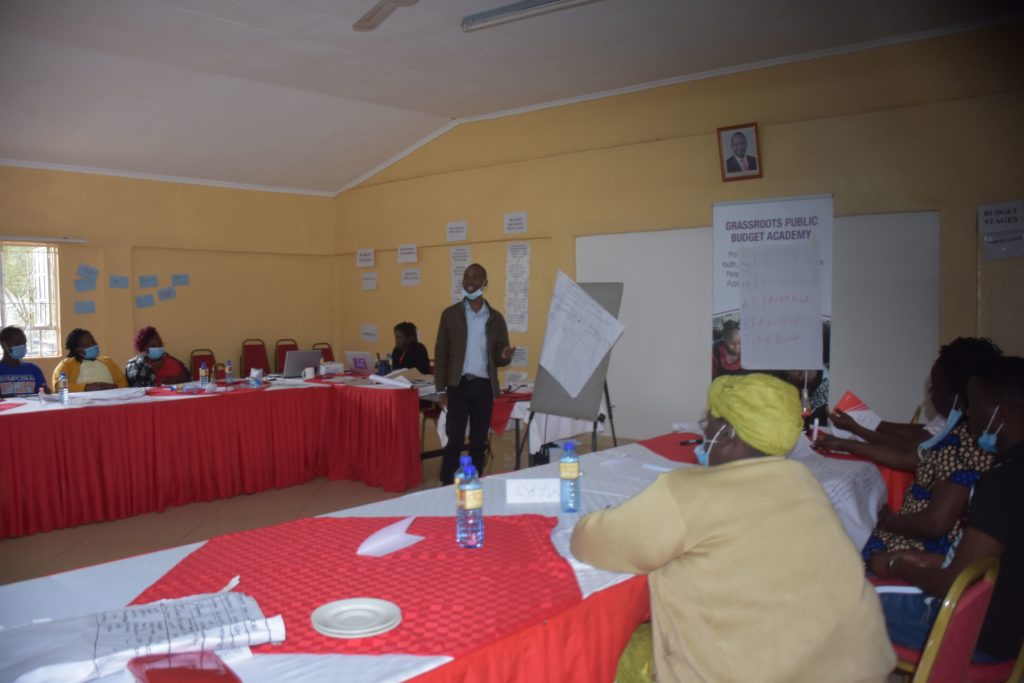Make Your Experiences Count. They Can Change the World.
LET’S BRING ALL OF OUR KNOWLEDGE AND EXPERIENCES TOGETHER.
TOGETHER WE KNOW MORE. TOGETHER WE ACHIEVE MORE. TOGETHER WE DO BETTER.
LET’S BRING ALL OF OUR KNOWLEDGE AND EXPERIENCES TOGETHER.
TOGETHER WE KNOW MORE. TOGETHER WE ACHIEVE MORE. TOGETHER WE DO BETTER.
Published: November 22, 2021
Grassroots participation in public budget planning
In Kenya – like in many other countries – Public Finance Management processes are still either misunderstood or not known at all to many citizens. They have remained a reserve of government technocrats and a section of elected leaders. As a result of this exclusionary process, access to quality public basic services is marred with gender, class, age, ethnic and regional inequalities.
In order to address this, GROOTS Kenya initiated in partnership with HORIZONT3000 a project called “Money Power” in short. The project – funded by the European Union, the Austrian Development Agency and the DKA Austria – promotes and strengthens public participation of grassroots women, youth, marginalized and indigenous people in public finance management for effective service delivery and reduced social (gender, generational and income) inequalities in the two counties of Muranga and Laikipia. The action recognizes engagement of the grassroots public in the decision-making processes as an essential mechanism of social accountability.
When the Money Power project started, GROOTS could build on established relationships with the County of Laikipia through the organisation’s long-term engagement in the county. Since GROOTS Kenya at that time was less present in Muranga, trust and relationship building still had to happen – in the midst of COVID-19 induced restrictions of movements and meetings.
Now, one and a half years after project start, the county government of Muranga has explicitly invited GROOTS Kenya to accompany the process and to submit proposals for the county budget for the upcoming year. I have talked with Emily Maranga, former manager of the women and leadership programme, how they made it this far.

What did you do to achieve this stage of cooperation?
When we started the Money Power project we did have some sort of relationship with the grassroots women in Muranga, having worked with them for a while and with the county government, namely the Lands Department. The relationship, however, had not been nurtured, so in terms of the departments that are specifically involved in county planning we could not rely on a solid foundation for collaboration.
What did you do to change this?
When the project started, we made efforts to establish a relationship between the grassroots women, GROOTS and county representatives. Success did not come easily, county officials seemed not to take it too seriously by sending junior staff to meetings. Then GROOTS staff like Jael and myself decided to reach out to the County Director of Economic Planning in 2020, and things started to change slowly but steady.
After lots of engagement and meetings with the County Budget Committee, the Assembly (policymakers), the County Executive (technical staff) and the grassroots women, we have managed to build a fruitful relationship. The county even provided a training for the women.
Why and how did they train the women?

When we were ready to establish the Budget Academy, we actually had a very lengthy internal discussion about the training on Public Finance Management. Instead of engaging a consultant or expert as always, we concluded that it would be best to get the County as facilitators on board. That’s the reason why in Muranga we reached out to the Director of Budgets, of Economic Planning and of Public Participation – representatives of the three core elements of the Public Finance Management cycle. We also got in touch with the County Assembly, since they are the ones who approve the budget.
Luckily, we could win the County Executive and the Assembly for the training facilitation. Therefore, throughout the entire process of the Budget Academy there was no need for consultants or experts.
After the first training cohort, together with the grassroots women we sat down with the County team in order to discuss why public participation in Muranga poses such a great difficulty compared to Laikipia for instance. As a result of the discussion, we formed a committee of 10 people – including representatives of the County, the grassroots women, GROOTS and the Director of Gender. Our main goal was to accelerate and enhance public participation in the County of Muranga.
What were key areas for improvement?
One of the key issues in Muranga public participation is the lack of information. We analyzed the county websites and noticed that all the information there was from 2016; information that is supposed to be put on yearly! So during the committee meetings we addressed it and they committed that they are going to update their website. And I am happy to report that by the end of September, their website was completely up to date with all new documents.
So that is how it’s we managed it. It’s just a lot of commitments, communication and to be honest on the part of Muranga the people I have mentioned were extremely willing to make the changes and to work with GROOTS, to work with the grassroots women and train them. That is how we have reached where we are and even were able to establish a public participation platform.
Our next step is to have the public participation bill gazetted in Muranga so as to make it law, so that it is in the assembly.

It is really so great to hear how the plan worked out, from the idea in the proposal to really having that platform!
I really have to give credit to Muranga County and the grassroots women. They have been very forthright and very committed in identifying the gaps, but also in doing something about it.
One of the key things that led to this cooperation is the fact that we cultivated the relationships like, you know, the way you water plants to make them grow.
The county representatives did not feel like they’re being brought in to seal something. They felt like it’s part of their problem. The fact that they were then also training the women and the budget champions helped to make them feel that we were all in this together. They were learning from the grassroots women themselves, like “these are the challenges we face in accessing information, these are the challenges in understanding this process”. The county representatives were able to react directly to that, they were providing the solution by training the women about how to make and read a budget. And that was also very instrumental in building the relationship.

What are the main issues raised by the grassroots movement for Muranga for more engagement by the county?
Once the graduates from the budget academy go back home, they meet with several groups. They carry out civic education in the community, and we use that opportunity to listen to the community and hear their priorities. That way, we are able to gather community priorities so that we can put them in the memoranda and share them with the county.
The outstanding priorities deal with agriculture around access to markets and water. And also issues like roads come up often, as they are directly connected to transportation of their produce. Besides, there were other issues around Gender Based Violence and Sexual and Reproductive Health Rights issues. Because this has become a really big thing, they want the county to prioritize GBV issues more on their agenda.
Have you already received a reaction?
This is still in process. Right now, we have to see whether these priorities have actually been included in the budgets. So once they prepared the new budget for next year, we have to follow up.
For me, the fact that we have the Director of Budgets and Director of Economic Planning in this little platform of ours is very good for us to push our priorities. We can directly ask them which of them have been included, or why they have not been included. The small size of the platform has great benefits too: Whenever you ask a question the County representatives don’t feel attacked like most county governments do when asked a question. This gives us the opportunity to push things our way.
Thank you for the interview!
The idea of this project was inspired by the Policy Dialogue Consortia project, funded by the Austrian Development Agency (ADA), where GROOTS Kenya has been participating in since 2014. Now, the experiences feed back into the same by GROOTS implementing learnings in the counties of Nyandarua and Kiambu, where capacities of women rural farmers are strengthened with regard to influencing gender responsive public investments.